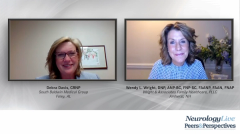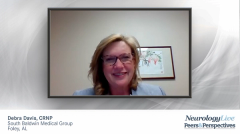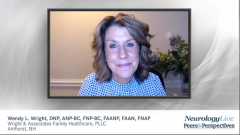
The Co-occurrence of Sleep Disorders with Other Health Conditions
Wendy L. Wright, DNP, ANP-BC, FNP-BC, FAANP, FAAN, FNAP, and Debra Davis, CRN, discuss the relationship between sleep disorders and other health conditions, such as cardiovascular, respiratory, and psychiatric diseases.
Episodes in this series

Wendy L. Wright, DNP, ANP-BC, FNP-BC, FAANP, FAAN, FNAP: I also want to ask you a little bit about whether you think that insomnia is linked with cardiovascular disease. And which comes first, or can one cause the other? We’ve read studies that people who have insomnia have higher rates of cardiac events. We know that respiratory diseases increase insomnia, but so, too, does pain, right? And other neurologic conditions. What do you think about that? What comes first, the chicken or the egg? Or does it depend?
Debra Davis, CRNP: What a good question. I was thinking about this while I was gearing up for this talk, and one of the things that I thought about was, I can be very pigeonholed. If someone comes in and I think they have cardiovascular disease, then I’m going down that cardiovascular trail. I’m going to get those labs, I’m going to get that electrocardiogram, I’m going to get that echocardiogram. Sleep doesn’t enter my thoughts, but it should. It really should, because when somebody’s not sleeping well that can cause their hypertension. It can cause right-sided heart failure. And in bad cases, it really can cause a stroke. So, you are right, chicken or egg, it should be in our thought processes. And so many times for me, it really is: cardiovascular disease is different from respiratory disease, which is different from neurologic disease. Well, wait a minute, they can very much be connected. And are they?
Wendy L. Wright, DNP, ANP-BC, FNP-BC, FAANP, FAAN, FNAP: Absolutely. I think it also poses a challenge that when you and I go to treat these individuals, most of the sleep medicines have warnings to be cautious or avoid use in individuals with severe COPD [chronic obstructive pulmonary disease] or severe apnea. The CPAP [continuous positive airway pressure machine] is great, but it’s not the be-all and end-all for everyone. As we get into our discussion on the different medicines available, I think it really provides a challenge to all of us: How do we treat these people who have these underlying diseases that may be causing their sleep issue, but maybe their sleep issue is causing some of these disorders as well.
One of the things I see, Debbie, and I wonder if you do, is that when people can’t sleep, they often eat, and they’ll try to stay up. They’ll eat foods to release their dopamine. There’s this new syndrome called night eating syndrome where people consume 25% of their total daily calories after their evening meal. And I find so often that those are my patients with insomnia. I don’t know if you’ve ever noticed any of that, but it’s just something that’s so interesting to me because they’ll tell me: “I start snacking because it keeps me focused on something and it keeps me awake.”
Debra Davis, CRNP: I haven’t seen that as much, but I do have patients who will have that problem because people often come to me for help with their obesity. I don’t give obesity drugs, but I do help them to figure out what’s causing it. And one of the first things I say is: “What are your booger bears?” You know: “You cannot sit there and tell me that you eat fish and vegetables and you’re this size. I’m sorry. That’s not what happens.” A lot of times I’ll make them keep a diet diary because I tell everybody we all have calorie amnesia. I tell them I work in a doctor’s office and people bring us stuff. In the back there are cookies, all kinds of stuff. And we walk back there and grab something and keep going. Well, when you’re going to feed me lunch, have I eaten since breakfast? No. I haven’t. Yes, I have. Yes, I have. And that’s the same way with that late-evening eating. It doesn’t count. “It wasn’t breakfast, lunch, or dinner, so it doesn’t count in my calories.” Yes, it does. But so many times we forget about that. A lot of times I will ask them to keep a diet diary.
Wendy L. Wright, DNP, ANP-BC, FNP-BC, FAANP, FAAN, FNAP: Do you think people understand the relationship between their insomnia and some of these other conditions that we have been talking about today?
Debra Davis, CRNP: Not only do people not understand, but I don’t think doctors and nurse practitioners totally understand, because sleep is so restorative. It’s where our heart rate normalizes, it’s where our respirations normalize. It is restorative. And if you don’t have that, then yes, you do get into these other problems. And so I really do think that it’s not heavy on our minds when somebody’s in the room. It’s like you said, it’s a 15-minute check-in process and then you come in the room after your nurse is in the room and you’ve got 10 minutes or 5 minutes to get to the core of the problem. And so many times, people will say to me, “I know you hate lists.” No, I love lists. It keeps us on track. It tells me what’s going on. But it’s that second thought, that extra step of saying: “All right, you have high blood pressure, you’re a little overweight. Do you have sleep apnea? But are you sleeping?” Is that the next process? And it’s like you said, sometimes you don’t want to open that Pandora’s box, but you really do need to.
Wendy L. Wright, DNP, ANP-BC, FNP-BC, FAANP, FAAN, FNAP: I firmly believe, and I will go to my grave believing this because I believe this about me, that if I don’t sleep, I’m not a good person. And I know that I have always been that way and have always needed a certain amount of sleep. I’m a 7- to 8-hour a night girl, and I tell people all the time, “I don’t care if the world is coming to an end, I’m going to bed.” Because I recognize that sleep is so important, but in this country, it’s become sexy not to sleep. It’s that badge of honor, like “I only need 4 hours of sleep.” And that’s really disheartening, because I don’t believe that people always realize that those 4 and 5 hours a night are so detrimental to everything that is happening while you’re sleeping, that healing process. I don’t think people always understand the interrelationship, and I don’t think that providers always understand it. And even if they do, I think that the system has become so overburdened for providers, NPs, physician assistants, MDs, that I think people are so overwhelmed that they just don’t want to ask about another issue that they’re going to have to go down that road to address.
Transcript edited for clarity
Newsletter
Keep your finger on the pulse of neurology—subscribe to NeurologyLive for expert interviews, new data, and breakthrough treatment updates.













